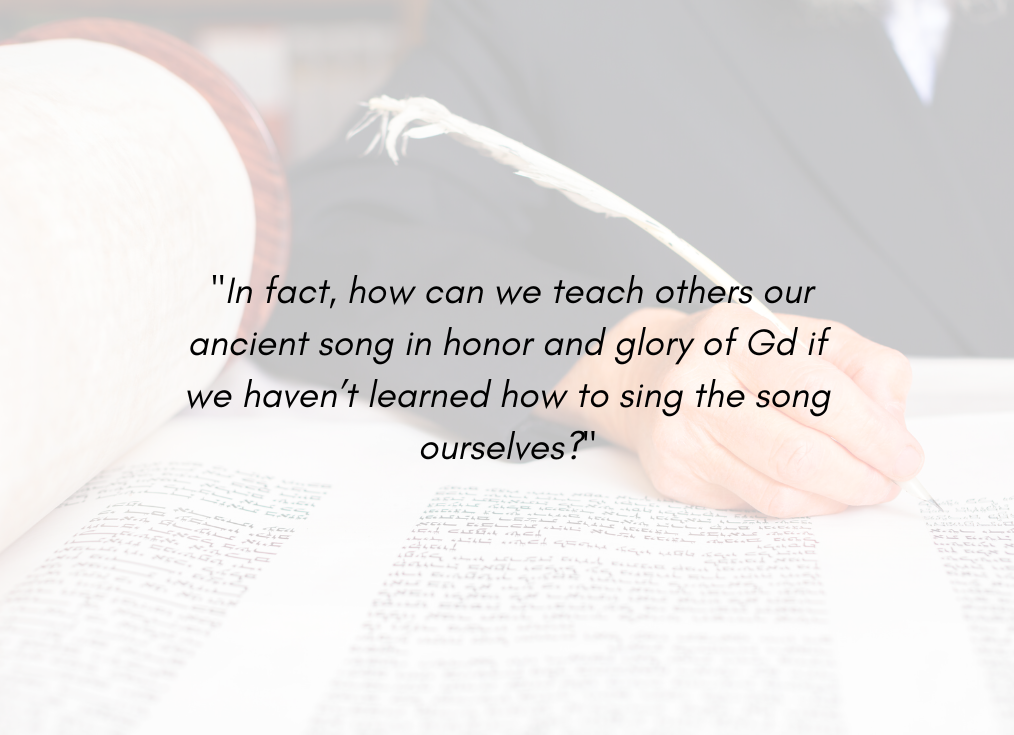From Learning to Teaching

October 2, 2022 / 5 Tishrei 5783
It is in this week’s Torah portion, Vayelech, where we are commanded to fulfill the final (613th) mitzvah of scribing a Torah. “Now, write for yourselves this song, and teach it to the Children of Israel. Place it into their mouths, in order that this song will be for Me as a witness for the children of Israel.” (Deuteronomy 31:19)
I remember as a child being taught that the last mitzvah of the Torah, the 613th commandment, was to scribe a Torah. However, it wasn’t until adulthood that I discovered that the text described the scribing of a Torah as “writing” it for oneself but with the intent to use it to “teach it” to the community.
Today, few of us have the skills, training, aptitude, or capacity to dedicate a year-plus to personally scribing the 304,805 letters using a feather and organic ink on the naturally prepared parchment. Instead, we fulfill this mitzvah by participating in the creation of congregational or community Torahs. And obviously, upon completion of these community Torah scrolls, they are then used to “teach” our community and future generations during services, celebrations, b‘nai mitzvahs, and other teachable moments.
But the lesson of doing something for oneself in order to teach and impact others is something that should not be lost on the sole act of scribing a Torah. In fact, taking time to do things for ourselves can and should be a priority from time to time. The responsibility to make sure that we are in a good, healthy, and positive state of mind is essential. How much better are we to those around us when we are in the right state of mind?
It is not a coincidence that the lesson from this week’s Torah portion is the one read between Rosh Hashanah and Yom Kippur. During these aseret yamei teshuvah (Ten Days of Repentance), often called the yomim noraim (Days of Awe), being reminded that in order for us to take care of others, have positive interactions, build healthy relationships, and help make the world a better place, we need to make sure that we have our own proverbial “house” in order. How can we teach Torah if we haven’t internalized it and made it our own? In fact, how can we teach others our ancient song in honor and glory of Gd if we haven’t learned how to sing the song ourselves?
In his biography, Charles Darwin wrote, “If I had my life to live over again, I would have made a rule to read some poetry and listen to some music at least once every week.” Although I am confident that Darwin was not referring to the music of the Torah’s cantillations (although maybe he was???), his reflection is still very apropos. How many of us in the moment don’t appreciate or recognize the opportunities we have to listen to and enjoy the music of life?
On this Shabbat Shuvah (Shabbat of Repentance), may we all take the time to stop and listen to the music, the rhythm, and the poetry of our song. This is our time to learn our song so we can teach it to those around us. If we stop in the act of, or even after learning, our song, then we haven’t completely fulfilled this 613th mitzvah. It is incumbent upon us to share the lessons of our song, the values, morals, and ethics which have come to direct our lives, in order for us to be…
May you have an easy fast. Shabbat Shalom,

